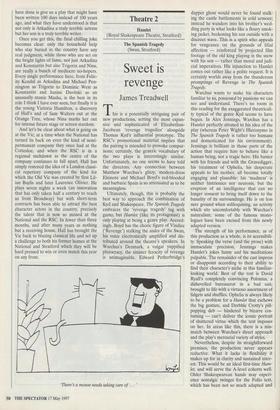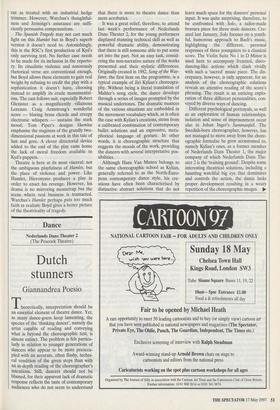Theatre 2
Hamlet (Royal Shakespeare Theatre, Stratford) The Spanish Tragedy (Swan, Stratford)
Sweet is revenge
James Treadwell
This is a potentially intriguing pair of new productions, setting the most expan- sive and sophisticated of Elizabethan- Jacobean 'revenge tragedies' alongside Thomas Kyd's influential prototype. The RSC's promotional material implies that the pairing is intended to provoke compar- isons; certainly, the generic vocabulary of the two plays is interestingly similar. Unfortunately, no one seems to have told the directors. Any connection between Matthew Warchus's glitzy, modern-dress Elsinore and Michael Boyd's red-blooded and barbaric Spain is so attenuated as to be meaningless.
Ultimately, though, this is probably the best way to approach the combination of Kyd and Shakespeare. The Spanish Tragedy embraces the 'revenge tragedy' tag with gusto, but Hamlet (like its protagonist) is only playing at being a genre play. Accord- ingly, Boyd has the choric figure of Vindice (`Revenge') stalking the aisles of the Swan, his voice electronically amplified and dis- tributed around the theatre's speakers. In Warchus's Denmark, a vulgar yuppified plutocracy, the sinister ferocity of revenge is unimaginable. Edward Petherbridge's `There's a mouse needs taking care of . . . ' dapper ghost would never be found stalk- ing the castle battlements in cold armour; instead he wanders into his brother's wed- ding party in what looks like a floury smok- ing jacket, beckoning his son outside with a discreet wave. This is a spirit who appeals for vengeance on the grounds of filial affection — reinforced by projected film footage of the old king playing in the snow with his son — rather than moral and judi- cial imperatives. His injunction to Hamlet comes out rather like a polite request. It is certainly worlds away from the thunderous promptings of Revenge in The Spanish Tragedy.
Warchus wants to make his characters familiar to us, possessed by passions we can see and understand. There's no room in this reading for the exaggerated theatricali- ty typical of the genre Kyd seems to have begun. In Alex Jennings, Warchus has a Hamlet perfectly attuned to his idea of the play (whereas Peter Wight's Hieronymo in The Spanish Tragedy is rather too humane and domesticated for his environment). Jennings is brilliant in those parts of the action that require him to behave like a human being, not a tragic hero. His banter with his friends and with the Gravedigger, his treatment of Ophelia, his desperate appeals to his mother, all become totally engaging and plausible: his 'madness' is neither histrionics nor neurosis, but the eruption of an intelligence that can no longer consent to bring itself down to the banality of its surroundings. He is on less sure ground when soliloquising, an activity which sits uncomfortably with Warchus's naturalism; some of the famous mono- logues have been excised from this newly adapted version.
The strength of his performance, as of this production as a whole, is its accessibili- ty. Speaking the verse (and the prose) with immaculate precision, Jennings makes Hamlet's jokes funny and his meditations palpable. The remainder of the cast impress or disappoint according to their ability to find their character's niche in this familiar- looking world. Best of the rest is David Ryall's completely convincing Polonius, a dishevelled bureaucrat in a bad suit, brought to life with a virtuoso assortment of fidgets and shuffles. Ophelia is always likely to be a problem for a Hamlet that eschews the big gesture, and Derbhle Crotty's pill- popping deb — hindered by bizarre cos- tuming — can't deliver the iconic portrait of shattered virtue which the text imposes on her. In areas like this, there is a mis- match between Warchus's direct approach and the play's mercurial variety of styles.
Nevertheless, despite its straightforward premises, the production never appears reductive. What it lacks in flexibility it makes up for in clarity and sustained inter- est. This would be an ideal first-time Ham- let, and will serve the A-level cohorts well. Older Shakespearean hands may experi- ence nostalgic twinges for the Folio text, which has been not so much adapted and cut as treated with an industrial hedge trimmer. However, Warchus's thoughtful- ness and Jennings's assurance are suffi- ciently persuasive compensations.
The Spanish Tragedy may not cast much light on this Hamlet but in Boyd's superb version it doesn't need to. Astonishingly, this is the RSC's first production of Kyd's only surviving text. No further case needs to be made for its inclusion in the reperto- ry. Its ritualistic violence and sonorously rhetorical verse are conventional enough, but Boyd allows these elements to gain real weight by refusing to credit the play with a sophistication it doesn't have, choosing instead to amplify its crude monumental- ism. The cast follows suit, especially Robert Glenister as a magnificently villainous Lorenzo. Craig Armstrong's wonderful score — blaring brass chords and creepy electronic whispers — sustains the stark mood; Tom Piper's designs likewise emphasise the staginess of the grandly two- dimensional passions at work in this tale of lust and gore. A clever directorial device added to the end of the play rams home the lack of moral freedom available to Kyd's puppets.
Theatre is here at its most visceral: not the ambiguous playfulness of Hamlet, but the place of violence and power. Like Hamlet, Hieronymo produces a play in order to enact his revenge. However, his drama is no mirroring mousetrap but the scene where real business is transacted. Warchus's Hamlet perhaps puts too much faith in realism; Boyd gives a better picture of the theatricality of tragedy.



































































 Previous page
Previous page